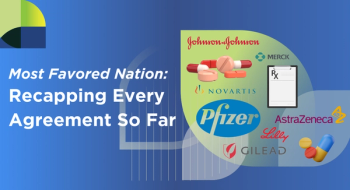
Pharmacy Week in Review: House Passes Pharmacy Gag Clause Bill, Health Care Leaders Seek to Address Drug Shortages
A look at last week's top stories in the world of pharmacy.
A look at last week's top stories in the world of pharmacy.
Transcript
Hello and welcome to the Pharmacy Times News Network. I’m Nicole Grassano your host for our Pharmacy Week in Review.A bipartisan bill that would lift gag clauses prohibiting pharmacists from sharing prescription drug prices with customers was unanimously passed by the House this week, Pharmacy Times reported. Federal lawmakers also unanimously passed a bill that would give Medicare patients further access to drug prices. Both bills previously passed Senate approval, unanimously, and await President Donald Trump’s signature for the policies to be enacted. According to lawmakers, the bills are expected to receive support from the president. The bill does not include a bipartisan provision that would have required drug manufacturers to be more transparent with costs to consumers after it was blocked by House Republicans.A coalition of health care industry leaders seeking to address drug shortages recently hosted a summit in Washington, DC, to examine vulnerabilities in the supply chain and ways that they might be strengthened, Contemporary Clinic reported. The daylong meeting brought together representatives of clinician groups, government officials, and supply chain entities, including pharmaceutical companies to discuss disaster preparedness and response efforts, as well as potential risks to national security, because of drug shortages. The summit “Drug Shortages as a Matter of National Security: Improving the Resilience of the Nation’s Health Care Critical Infrastructure” was an invitation-only event. Participants included officials from the American Society of Health-System Pharmacists, the American Hospital Association, the American Society of Anesthesiologists, the American Society of Clinical Oncology, and the Institute for Safe Medication Practices.New vaccines to treat some of the world’s most prevalent infectious diseases are not on the horizon, according to a study led by Duke University's Center for Policy Impact in Global Health, Specialty Pharmacy Times reported. A financial modeling tool showed that the pipeline is unlikely to produce effective new vaccines for HIV, malaria, or tuberculosis, which could have a significant effect on the global spread of infectious diseases, according to the researchers. The study evaluated the current pipeline, which included 538 candidate medications for 35 neglected diseases to project the cost and probability that each product would hit the market. The study authors used the portfolio-to-impact financial model to evaluate drugs, vaccines, diagnostics, and other technologies in various stages of development, from preclinical research to advanced clinical trials. Each candidate product was classified into one of several developmental pathways to project the cost of taking it to market. Although the P2I tool does not forecast the clinical implications or utility of the product, it does calculate the cost and likelihood of the product entering the market.Pharmacists may get more questions about Trelegy if their patients have seen a new commercial for the prescription medication. In the spot, called “Three-in-One Medicine,” a woman spending time with her family on the beach says she wanted more from her COPD medication. But she gets the power of three medicines with Trelegy. According to the commercial, Trelegy opens airways, keeps them open, and reduces inflammation.For more great coverage and practical information for today’s pharmacist, visit our website and sign up for our Daily eNews. And don’t forget to follow us on Facebook, Twitter, and Instagram. Thanks for watching our Pharmacy Week in Review. I’m Nicole Grassano at the Pharmacy Times News Network.
Newsletter
Stay informed on drug updates, treatment guidelines, and pharmacy practice trends—subscribe to Pharmacy Times for weekly clinical insights.


























